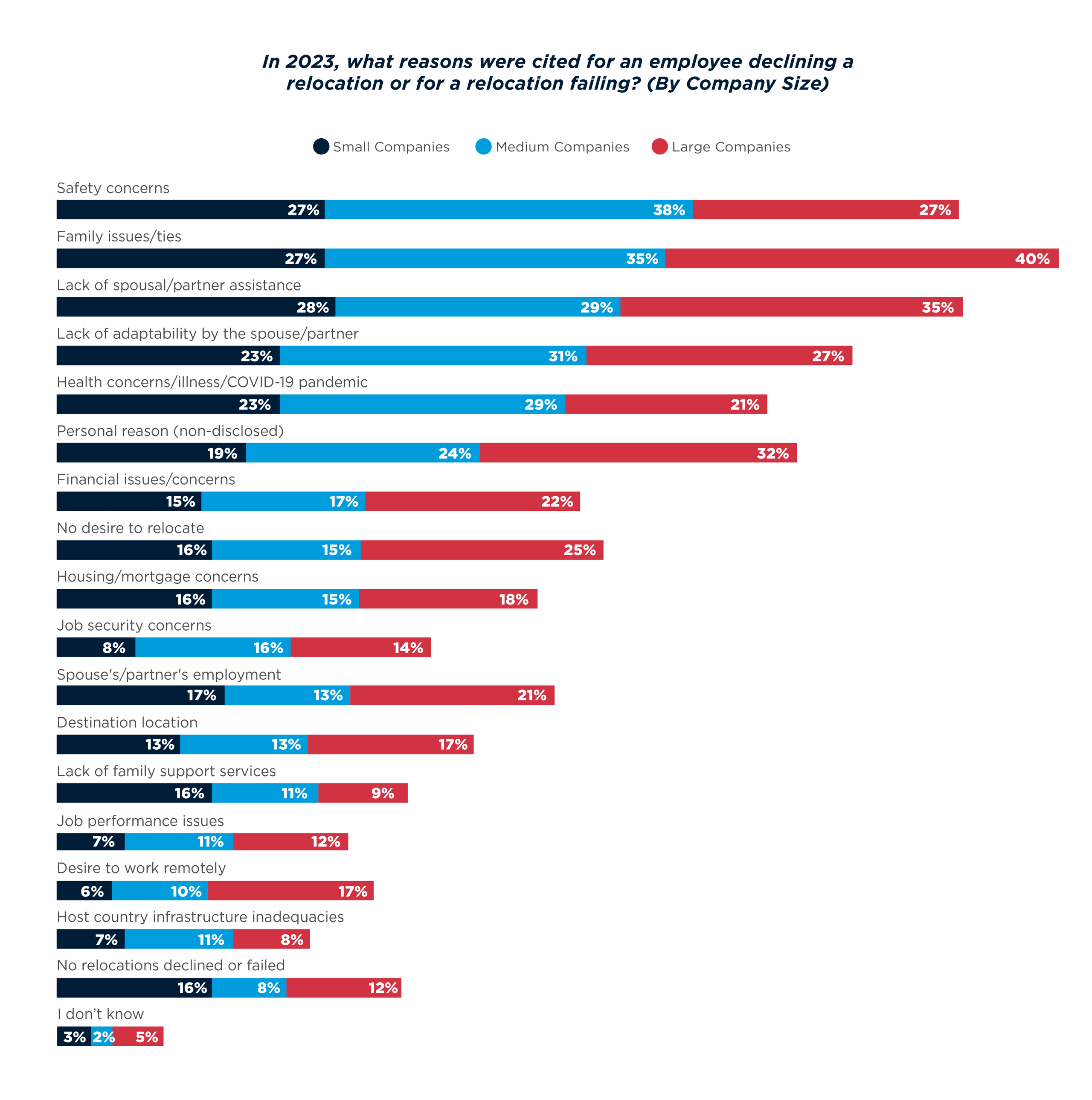EMPLOYEES DECLINING RELOCATION
64% of companies reported that an employee declined the opportunity to relocate in 2023.
50% of companies relocating employees internationally reported that the number of employees declining relocation increased in 2023. Only 22% of companies who relocated domestically reported that the number of employees declining relocation had increased. Companies relocating employees domestically were more likely to report that the number of employees declining relocations stayed the same, at 45%, compared to 29% of companies relocating employees internationally who reported the number of employees declining relocation stayed the same.
Safety Concerns stood out as a specific reason employees declined relocation, with 44% of companies relocating employees internationally responding this was a reason employees declined relocation, compared to 12% of companies that only relocated employees domestically.
Other reasons employees declined relocation (family issues/ties and lack of spouse/partner assistance) are common themes from past surveys. Atlas® Corporate Relocation Surveys. Many U.S. households experienced financial pressure as a result of the state of the economy and inflation. For many of those households, dual incomes are likely inflexible, especially with 61% of the workforce unable to work using hybrid or remote models, making them unable to relocate without finding a new job.
Although inflation has eased, that is not reflected across all items in the Consumer Price Index. For individual households, prices remain high for certain goods and services, creating economic pressures that may make relocation unrealistic, or an unnecessary hardship.
- 58% of small companies reported an employee declined relocations in 2023.
- 64% of medium companies reported an employee declined relocations in 2023.
- 70% of large companies reported an employee declined relocations in 2023.
- 35% of companies reported Safety Concerns (including war, terrorism, and political unrest) as a reason employees declined relocation in 2023, a 2-point decrease from 37% in 2022.
- 34% of companies reported Family Issues/Ties as a reason employees declined relocation in 2023, a 2-point increase from 32% in 2022.
- 30% of companies reported Lack of Spousal/Partner Assistance as a reason employees declined relocation in 2023, unchanged from 30% in 2022.
50% of companies relocating employees internationally reported that the number of employees declining relocation increased in 2023. Only 22% of companies who relocated domestically reported that the number of employees declining relocation had increased. Companies relocating employees domestically were more likely to report that the number of employees declining relocations stayed the same, at 45%, compared to 29% of companies relocating employees internationally who reported the number of employees declining relocation stayed the same.
Safety Concerns stood out as a specific reason employees declined relocation, with 44% of companies relocating employees internationally responding this was a reason employees declined relocation, compared to 12% of companies that only relocated employees domestically.
Other reasons employees declined relocation (family issues/ties and lack of spouse/partner assistance) are common themes from past surveys. Atlas® Corporate Relocation Surveys. Many U.S. households experienced financial pressure as a result of the state of the economy and inflation. For many of those households, dual incomes are likely inflexible, especially with 61% of the workforce unable to work using hybrid or remote models, making them unable to relocate without finding a new job.
Although inflation has eased, that is not reflected across all items in the Consumer Price Index. For individual households, prices remain high for certain goods and services, creating economic pressures that may make relocation unrealistic, or an unnecessary hardship.

